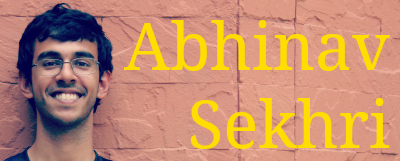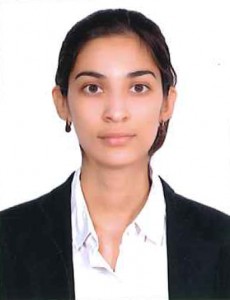At every district court in Delhi today, you can see banners urging litigants to consider alternate methods for dispute resolution. Section 89 of the Code of Civil Procedure, 1908 empowers a court to send parties for an out of court settlement where it appears possible. Such a settlement may be arrived at through arbitration, conciliation, judicial settlement, or mediation. The preferred method, judging by the frequency of the banners, is mediation. Given the clear systemic importance given to this method, one must ask whether law schools are acting on this cue. I spoke with Suveni Bhagat, an associate at Khaitan & Co. Excerpts from our conversation follow.
Abhinav Sekhri: What was your exposure to mediation activities in law school?
Suveni Bhagat: I was the Joint Convenor of the Alternate Dispute Resolution (“ADR”) Board of my college for a year during college and actively participated in ADR activities like client counselling, negotiation, and mediation. I also undertook a course on negotiation and conflict resolution during my exchange spell at the Singapore Management University. Organisational experience apart, my first participation in a mediation competition came at the International Academny of Dispute Resolution (“INADR”) Mediation Competition organised by NLIU Bhopal in 2011. The INADR delegates from the USA undertook a two-day training programme for us, and I found out later that they are also involved in training the mediators at various district courts in India.
AS: How much value, according to you, does the law school environment attach to mediation activities as against other co-curricular ones? Where does it rank?
SB: Well, while mooting and debating had independent activity-based committees across law schools, I wasn’t aware of ADR having the same standing. The ADR Board at NLS Bangalore was also part of another committee when I was the Joint Convenor. I think that is also a product of the nascent stage of the relationship between law schools and ADR competitions. There are very, very few mediation competitions organised in India and most of them had their first edition just 2-3 years ago. The growing popularity of these activities is bound to change that. Another thing I found problematic was the way in which students considered these activities ‘easy’ requiring little skill, as opposed to something like mooting. Of course you don’t need to read tons of cases for mediation, but there is a different kind of skill involved. Persuasion requires training and practice. The good mediators know a lot of different techniques and approaches, and are quick on their feet because they go through a lot of practice scenarios.
AS: What (if any) opportunities did the law school academic curriculum offer to students for learning mediation skills, both regular courses and credit courses?
SB: We did have a course on ADR in our third year. However, around 75% of that course was dedicated to arbitration, and the rest was spent on negotiation and mediation. We did have mock negotiation sessions, but not for mediation. I think the course did not provide any insight on mediation as a skill and how it works in practice. During my time at law school, there weren’t any credit courses on mediation.
AS: Currently, most law schools offer a course on court litigation. Do you think the current focus on imparting litigation skills should be relaxed to help students learn mediation skills?
SB: Not necessarily, because at least at NLS, that course taught various practical aspects of the entire legal process. But certainly I think the curriculum can be tweaked a bit to teach mediation theory and have practical sessions. The practical sessions are key, because mediation involves so much more than pure legal knowledge. It is more about handling advocates and their clients, trying to understand their requirements and resolve the issue, without imposing or forcing your own solution on them. This could be well supplemented with an increase in mediation competitions, which always do well to garner student interest.
AS: How do you think students would benefit from this skill-set in their different potential workplaces?
SB: I think the very obvious benefit would be to understand the role of the mediator and more  importantly, the role of an advocate in a mediation. Considering cases are sometimes referred by the court to mediation, I think it would definitely be useful for law students to know the role of an advocate in mediation is different from that in court, and that the approach has to be different in order to get the best results for the client. Moreover, I think possibly the most important skill set that students can learn from mediation and negotiation is to approach issues with a win-win attitude, as opposed to a win-lose attitude, as in many cases there are joint gains that can be reaped. Splitting the difference, as is commonly suggested by many people, is an approach that actually undermines the results that can be achieved for both parties involved. One of the other important things that it teaches is to focus on the problem at hand, and not the people, so you can avoid ego issues getting in the way of resolving a conflict. The important understanding that negotiation should be not be based on positions but on interests (the classic fight over an orange example) and that it is imperative that you separate the problem from the people to achieve the best results. Further, the skill set developed as a result of training in mediation regarding handling people and figuring out the solution would be useful in any potential workplace, as it would help in not only dealing with an opposite counsel or party, but also your own client and organisation. Overall, I definitely think that mediation training helps you achieve a more well-rounded approach to dealing with conflicts and the acquired skill set would definitely benefit students in their varied potential workplaces.
importantly, the role of an advocate in a mediation. Considering cases are sometimes referred by the court to mediation, I think it would definitely be useful for law students to know the role of an advocate in mediation is different from that in court, and that the approach has to be different in order to get the best results for the client. Moreover, I think possibly the most important skill set that students can learn from mediation and negotiation is to approach issues with a win-win attitude, as opposed to a win-lose attitude, as in many cases there are joint gains that can be reaped. Splitting the difference, as is commonly suggested by many people, is an approach that actually undermines the results that can be achieved for both parties involved. One of the other important things that it teaches is to focus on the problem at hand, and not the people, so you can avoid ego issues getting in the way of resolving a conflict. The important understanding that negotiation should be not be based on positions but on interests (the classic fight over an orange example) and that it is imperative that you separate the problem from the people to achieve the best results. Further, the skill set developed as a result of training in mediation regarding handling people and figuring out the solution would be useful in any potential workplace, as it would help in not only dealing with an opposite counsel or party, but also your own client and organisation. Overall, I definitely think that mediation training helps you achieve a more well-rounded approach to dealing with conflicts and the acquired skill set would definitely benefit students in their varied potential workplaces.
(Abhinav Sekhri is an advocate practising in Delhi.)


